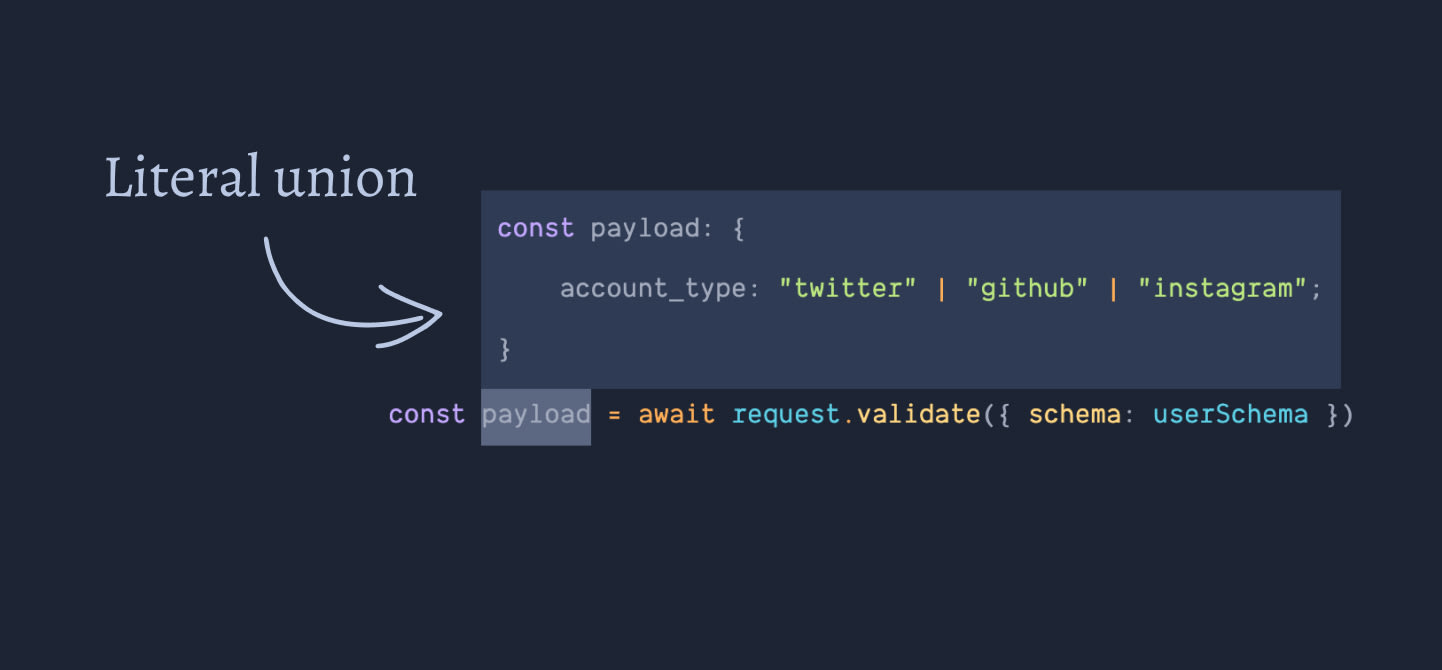enum/enumSet
Validates the property to be one from the available choices. The return value data type for the enum type is a TypeScript union.
import { schema } from '@ioc:Adonis/Core/Validator'
{
account_type: schema.enum(
['twitter', 'github', 'instagram'] as const
)
}

You can also make use of TypeScript enums.
enum SocialAccounts {
TWITTER = 'twitter',
GITHUB = 'github',
INSTAGRAM = 'instagram',
}
{
account_type: schema.enum(Object.values(SocialAccounts))
}
Mark as optional
You can mark the property to be optional by chaining the optional method. The undefined and the null values are considered optional and removed from the validated object.
{
account_type: schema.enum.optional(Object.values(SocialAccounts))
}
Mark as nullable
You can mark the property to be nullable by chaining the nullable method. The nullable fields must exist in the payload but can contain null values.
{
account_type: schema.enum.nullable(Object.values(SocialAccounts))
}
Mark as nullable and optional
Mark the property both as nullable and optional. If the field value is undefined, it will be removed from the validated object. Otherwise, the validated value (including null) is returned.
{
account_type: schema.enum.nullableAndOptional(Object.values(SocialAccounts))
}
Define additional rules
You can define an array of additional rules as the second parameter.
import { schema, rules } from '@ioc:Adonis/Core/Validator'
{
account_type: schema.enum(Object.values(SocialAccounts), [
rules.unique({
table: 'user_social_accounts',
column: 'service',
}),
])
}
enum options as refs
If your enum options relies on the runtime values and you are using the schema caching, then you must move them to the refs.
Following is example of defining options via refs.
import { schema } from '@ioc:Adonis/Core/Validator'
import { HttpContextContract } from '@ioc:Adonis/Core/HttpContext'
/**
* Dummy implementation returning hardcoded list of cities
*/
function getCities(_state: string) {
return ['Mumbai', 'Pune', 'Nagpur']
}
export default class CreateUserValidator {
constructor (protected ctx: HttpContextContract) {
}
public refs = schema.refs({
cities: getCities(this.ctx.request.input('state'))
})
public schema = schema.create({
city: schema.enum(this.refs.cities)
})
public cacheKey = this.ctx.routeKey
}
enumSet
The schema.enumSet type is similar to the enum type, instead it accepts an array of one or more values.
In the following example, the user can select one or more skills.
{
skills: schema.enumSet([
'Programming',
'Design',
'Marketing',
'Copy writing',
] as const)
}
Custom messages options
The enum and the enumSet schema types passes the choices array to custom messages.
{
'enum': 'The value must be one of {{ options.choices }}',
'enumSet': 'The values must be one of {{ options.choices }}',
}